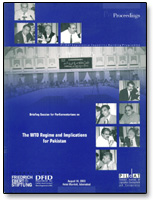The briefing Session on the “WTO Regime and its implications for Pakistan” was held at Hotel Marriott, Islamabad on August 8, 2003 by the Pakistan Institute of Legislative Development and Transparency-PILDAT. The main objective of the session was to help Parliamentarians develop a better understanding of WTO related issues in order to ensure greater parliamentary participation. The briefing session provided an opportunity for exchange of information between parliamentarians, economists and other experts on WTO related issues, and policy makers. Three major issues were discussed during the session: effects of WTO policies on Pakistan, how to increase Pakistan’s competitiveness in world markets, and how to strengthen our position for future negotiations. Although different opinions and perspectives emerged on these issues, participants felt that direct parliamentary participation in policy-making was necessary to ensure more transparency and better representation of the citizen’s interests. There was a general consensus at the briefing session about the need for better coordination between policymakers and the private sector. Some participants also suggested establishing a parliamentary task force on WTO related issues, or more specifically a sub-committee on WTO agreements of the Parliamentary standing committee on Commerce. They felt that with the growing impact of WTO on important areas such as food security, employment, and industrial competitiveness, and consequently on wide-ranging social and economic arrangements, Pakistan can no longer afford to leave WTO members and governments to negotiate on their own.
The WTO Regime and Implications for Pakistan
Briefing Session for Parliamentarians







